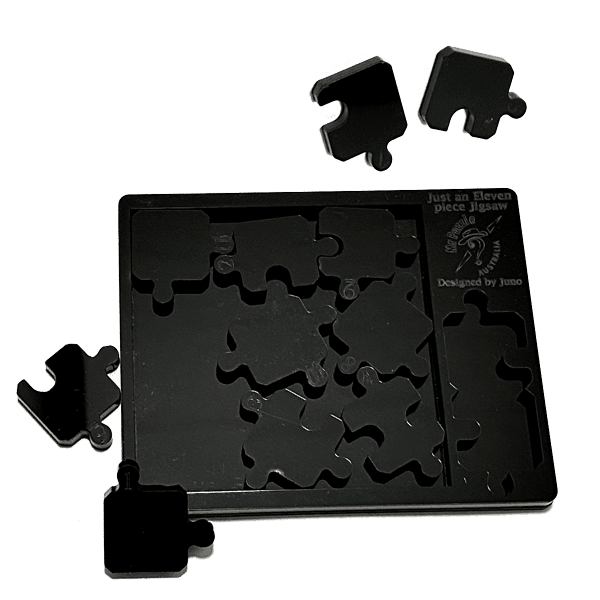Voyage to Terra Australis double sided packing puzzle
4 August 2014Edward Hordern IPP34 Puzzle Exchange – London, England. August 2014. 222 made. Presented by Brian Young. Made by Mr Puzzle Australia. Designed by Junichi Yananose.…


The object of the puzzle is to pack all 11 pieces inside the large square frame. YES! That does include the two separate pieces on the side of the tray.
The pieces must be flat and not overlap at all. And no force is necessary to squeeze them in. In fact, when it’s solved correctly there is movement and spare space; enough spare space that if you tip the puzzle upside down the pieces will immediately fall out.
Even though the pieces are numbered they can be flipped over. The numbers are to help match to the solution. They do not matter when solving the puzzle.
This puzzle has been on the back burner for some years now. It was supposed to be presented at the International Puzzle Party back in 2020 but we all know what happened that year.
Juno designed it a few years before that and when Brian took a prototype to IPP39 in Japan in 2019 no one could solve it. And no. Brian didn’t solve it either! A very hard puzzle. And yet it’s only 11 pieces.
People often wonder how Juno comes up with such hard and varied puzzles; here’s some insight he gave for this one:
After seeing Yuu Asaka’s jigsaw puzzle entry in the 2018 Puzzle Design Competition, Juno pondered what weird ideas could be incorporated into a jigsaw puzzle. Typical jigsaw puzzles have protrusions and indentations on four sides and can be seen as being based on squares. This led Juno to think about the mathematical problem of fitting multiple squares of the same size into the smallest possible square.
Among the solutions considered optimal, he was particularly drawn to the problem with eleven squares. Even when fitting eleven squares of the same size into a larger square, there was still quite a bit of space left. He expected that by significantly increasing the number of protrusions compared to indentations in jigsaw puzzle pieces, they could fill this space while ensuring a unique arrangement of the pieces.
Many fine adjustments to the dimensions of the pieces were made along the way to minimise false solutions. The completed puzzle turned out to be much more challenging than anticipated. Even Juno himself struggles to remember the solution.
Size: 130mm x 105mm x 80mm
The tray is made from 6mm acrylic so that it feels substantial in your hand and it’s easier to pick up the pieces when you’re playing with it.
The pieces are numbered to be used with the solution to solve the puzzle when you’ve given up. They are just random numbers to help you match pieces to the solution page which is included. The numbers have no bearing on solving the puzzle itself.